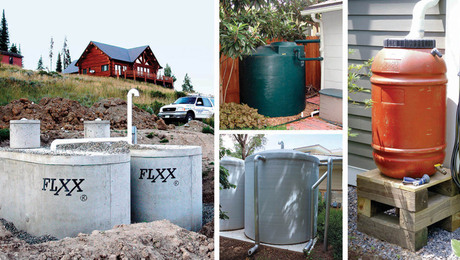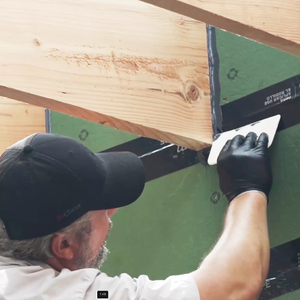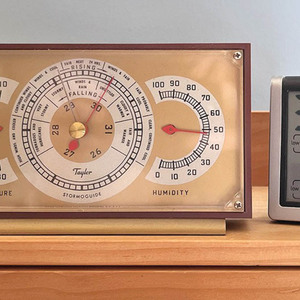ATLANTA, April 17 /PRNewswire-FirstCall/ — The Home Depot(R), the world’s largest home improvement retailer, today expanded its long-term commitment to the environment and sustainability by launching its Eco Options(SM) program in the United States. Eco Options is a classification that allows customers to easily identify products that have less of an impact on the environment and empowers them to help make a difference in their own homes.
The Home Depot has identified more than 2,500 Eco Options products, including all-natural insect repellents, cellulose insulation, front-load washing machines, organic plant food and vegetables in biodegradable pots. The wide array of Eco Options also includes compact fluorescent light (CFL) bulbs, programmable thermostats and certified wood.
http://www.bigbuilderonline.com/industry-news.asp?sectionID=363&articleID=478873
Parolee # 53804


















Replies
The bandwagon has started to roll..................
And best of all......................... we have Al Gore to thank for this.
the question is whether or not this is just another passing fad on the American corporate scene -- like Deming and his philosophy of quality.
********************************************************
"It is what we learn after we think we know it all, that counts."
John Wooden 1910-
Aphilosophy of Quality!!!That sounds crazy, but it just might work!!!NAH!!!I don't Know what I am doing
But
I am VERY good at it!!
I know many folks who claim to be "green" that commute to their office jobs in large SUVS. Makes me laugh. Al gore uses more energy to heat his pool house than most of use to heat our homes. That's OK though, because Al has purchased some carbon credits. :-)
The whole environmental religion is based on distortions of the truth. Do you remember back in the 70's when scientist were sounding the alarm about the impeding danger of global cooling? What a joke. We can't even reliably predict the weather a week from now. How can we predict the temperature of the earth 20 years out?
yea-yea, Sheik AlGore!
Nikki, you are just kidding around, I think! Deming was not a passing fad. His message didn't go over too well in <!----><!---->America<!----> when he first set out but he found receptive ears in <!----><!---->Japan<!----><!---->. After incorporating his ideas and adding their own they kicked butt all over the American manufacturing front. American companies had to step up to the line just to stay in business and many didn’t. The quality of car we drive today is only one example, whether it is a Ford or a <!----><!---->Toyota<!----><!---->. What was the last American TV anyone bought? The Deming concepts changed the landscape of manufacturing and form the basis for the more advanced concepts in use today by any manufacturer that wants to stay in business. Competition is fierce and global and businesses need every advantage they can get.<!----><!----><!---->
Green is here to stay as well. There are roughly 6 billion people on this little planet and that number is still going up. More importantly, countries like <!---->China<!----> and <!----><!---->India<!----><!----> whose people traditionally lived close to the land and therefore used few resources are now becoming urbanized and industrialized and the demand for resources from those same people is rising, adding to the rising demands of increasing population. Our increased costs for concrete, steel and fuel are directly related to this change. <!----><!---->
But the planet is only so large. We are animals and by definition to live we must eat plants and other animals and breathe oxygen put into the air by plants and drink water purified by microorganisms. Those plants themselves consume the products of other plants, animals, fungi, bacteria and so on in a vast, profoundly complex biological clockwork of interactions. We depend on that clockwork for our survival and for our quality of life. We do not understand how it all works yet it is clear we impact it by our demands on it. The parts of this machine are species and room for them to exist. Today the planet is losing species at a rate rivaling the Permian –Triassic extinction, a period of geologic catastrophe that saw the loss of most earthly species. In a complex machine, how many parts can you remove before its function is impaired? Or fails? The rate of loss is speeding up and will continue to speed up. This burgeoning interest in “green” is commendable yet pitiable compared to what it would actually take to even slow the loss.<!----><!---->
Apart from mere survival is the issue of quality of life. Who among us does not appreciate the woods and lakes and streams either just to witness their beauty or to hunt and fish or to escape the cloying density of neighbors and traffic and breathe fresh air? Yet how much further we must go every year to reach such open areas. And that same air carries mercury from coal fired power plants, the fish struggle to reproduce for the hormones in the water, we cannot eat them for the heavy metals that now contaminate them, our very bodies are receptacles for our own pollutants, lead, cadmium, PCB’s, hormones, pesticides, fire retardants, gasoline additives, industrial solvents. When natural systems that have been finely tuned over millions of years are disturbed by contaminants how will these systems, such as our own intensely complex physiological bodies or entire ecosystems comprised of countless other complex physiological systems, respond? Our children suffer asthma at shocking rates, ADD, super allergies, autism, autoimmune diseases, cancers. What of these are caused by manufacturing compounds present in our air, water and food?<!----><!---->
I like building. No, I love building. I love houses, old and new, I love the smell of wood, cement and paint. My truck gets 10 mpg on a good downhill. I have nine cars and a motorcycle. I have guns and I eat animals. I have an instinctual urge to cut down trees and burn things. The “green” movement is a pain in the neck to me. But I have to take it seriously. There must be a sea change in our attitude, in my attitude.<!----><!---->
Once we were small enough in number that the natural world around us absorbed the effects of our activities. But that time has past. This thin film of green that covers this solitary planet is all we have, everything we have ever known. This is where we were born where we will live and where we will die, this little blue globe, our garden of Eden. Will we keep our home in order? Are we builders or destroyers? If we make it a hell to live in then we will live in hell. If it fails, we will fail. <!----><!---->
A different perspective sometimes gives us another idea of the value of a thing:<!----><!---->
Looking outward to the blackness of space, sprinkled with the glory of a universe of lights, I saw majesty - but no welcome. Below was a welcoming planet. There, contained in the thin, moving, incredibly fragile shell of the biosphere is everything that is dear to you, all the human drama and comedy. That's where life is; that's where all the good stuff is. Loren Acton – Astronaut<!----><!---->
I reckon it’s worth the inconvenience.
– ruination waits<!----><!---->
You're preaching to the choir. I'm convinced, and I am utterly perplexed why this issue of global warming has become a bone of contention between between the conservatives and libs. I'm also aware of the transformative value of Demings' philosophy, particularly as it played out in the Japanese corporate culture.But it also seems to me that when Demings' ideas became more widely known 15-20 years ago in the U.S. arena, most corporations here gave lip service to quality mainly in their advertising, without really applying it to their corporate culture. Hence, we had companies like Ford changing their ad slogan to "Quality is Job #1."And I think that was a cynical attempt to play on the sensibilities of the consumer, without making any real changes in the way products were/are produced. We no longer hear much talk about "quality," and "green" seems to be the new by-word.Talk is cheap, and I don't think anything will change until the government takes a real leadership position in terms of both tax policy and regulation, which has been the case in the EU. And I don't see that happening here anytime soon, at least in any meaningful way.********************************************************
"It is what we learn after we think we know it all, that counts."
John Wooden 1910-
Edited 4/19/2007 1:45 am by nikkiwood
You're preaching to the choir.
Oh dear, Nikki, so sorry! ; ) I completely misunderstood where you were coming from. Now I see what you mean. The term becomes a buzz word, in the 70's it was "natural", in the 80's, as you said, "quality," the 90's "extreme," and now "green" and it gets slapped on everything from butter to tennis shoes and its meaning dizzolves in overuse. Pith becomes pablum. Amen to that.
Well, now that the sermon's over, would you lead us in a hymn?
- r
Deming - now there's a name I haven't heard in awhile. Let's hope the Eco thing is long term and easily verifiable.
Actually Deming's theorys are pure genius.
The problem is that his stuff needs to be alliied as a whole. The american corporations wanted to just select items a la carte. doing the stuff that wouldn't actually cost them any money and ignoring the stuff that they perceived as "too costly".
A good analogy would be to try to call me on the phone, but only dial 5 of the numbers.... then expect me to answer." If I were a carpenter"
I agree completely (that Demning was a genius), and you only have to look at what his thinking did for companies in Japan.And I agree with your second point. When Deming's contributions became more widely known in this country, "quality" became the new buzzword in corporate America -- but I think it all turned out to be all talk and no walk. I suspect the same thing is going to happen now that "green" is the new buzzword.********************************************************
"It is what we learn after we think we know it all, that counts."
John Wooden 1910-
The american corporations wanted to just select items a la carte. doing the stuff that wouldn't actually cost them any money and ignoring the stuff that they perceived as "too costly".
Let me recomend an excellent book on the topic, "American Business & The Quick Fix." [by Michael E. McGill ISBN-10: 0805015477 / ISBN-13: 978-0805015478]
Ok, just googled, it's OOP, but Amazon will do it's "used books" search for it.
Now, it's also a depressing book in some ways (but, it's an excellent "read," the conclusions are what are not uplifting).
But, it does help explain why biz always seems to want fixes, but never actually executes any of them.Occupational hazard of my occupation not being around (sorry Bubba)
I'll look for that book too. Thanks.
Can you give a summary of that book? Thanks.
"I went to the woods because I wished to live deliberately, to front only the essential facts of life, and see if I could not learn what it had to teach, and not, when I came to die, discover that I had not lived."
Parolee # 53804
Can you give a summary of that book? Thanks.
Title says it all, pretty much. Mik, an SMU biz prof looked into all the "quick fix" businesses out there, and noticed that there were scads of them. And there were "sequels" to almost every one. But, wait, if "one minute manager" works so well, why is there an improved 1MM?
Turns out there's a whole business in selling big businesses "easy," "fast," "quick" fixes to the hugely complicated problems all have. And, there's merchandising to go with that market--!MM note pads, coffee cups, etc. Daytimer, dayminder, big, small, electronic, bound in leather and in leatherette (or from cruelly harvested naugas . . . )
Yet, the businesses that seek these quick fixes out never seem to change; other than to a different, new, quick fix i nthe next, month, quarter, FY, managerial cycle, whatever. The real problem is that far too many companies confuse managing with leadership; while also having Demming-predicted failures in quality (or instead of, or in combination with, etc.)
It's a good real in that Mik takes a light-hearted romp through several of the bigger "QFs" to show some of the absurdities that happen. His writing is still very readable even when the subject gets to the heavy slogging of the what's really wrong aspects. I found that I wanted more on "how" a company goes from being a working leadership-run operation to a great walrus of a thing bloated with the inertia created by managers--but, that's me.
¿Mas claro? O agua de tierra?Occupational hazard of my occupation not being around (sorry Bubba)
i think i actually have to applaude Home Depot for doing this. the ave. homeowner is fed info all the time and most of it revolves around price and quality (both valid concerns) but now HD is offering a third criteria for making choices - (eco friendly). A very nice move. I'm sure they will turn it into profits as well.
"it aint the work I mind,
It's the feeling of falling further behind."
Bozini Latini
I think it is a good idea too. I hope Lowes ( and others ) will follow. I think many people do want to try & do the right thing but how to know what that right thing is ?? Hopefully the items selected will really be things that will have an actual impact on something other that the stores' profits.
I've noticed almost every magazine on the news stands this month has put out a 'green' issue. At the every least maybe they will give people some ideas that they can research further on their own. Bobbi
What you call green is debateable, but I'm with you. You can't make the definitions better or get a real system worked up until you start with something, and make it better.What would be great is if they opened up their criteria in a section on their website or something, and allowed for public feedback on the decisions. Let people tell them what they want to know and why.-------------------------------------
-=Northeast Radiant Technology=-
Radiant Design, Consultation, Parts Supply
http://www.NRTradiant.com
What would be great is if they opened up their criteria in a section on their website or something, and allowed for public feedback on the decisions. Let people tell them what they want to know and why.
******
Maybe we should just tell them anyway for a prod in the right direction ;-)Bobbi
I think it's a nice idea, but is it going to be like the biodegradable plastic bags? What a rube holiday that was.
What a rube holiday that was
LOL, I was doing some work for a chemical eng. prof at the University of Iowa when that stuff hit the market and that about summed up his sentiments!
If the whole idea of this marketing ploy, and thats probably what it is, gets people to at least give some condsideration to the what they are buying then its probably a good idea.
Look for Lowe's to come along with a new word for eco-friendly and do the same.
Doug
I'm a big believer that a lot of small changes will have the greatest impact, both in mindset and actual usage of resources.
For instance...
- Change a bulb. If every American family replaced just one incandescent light bulb with an energy-saving compact fluorescent bulb, CO2 emissions would drop by more than 90 billion pounds—the same as taking 7.5 million cars off the road.
buic
Edited 4/18/2007 10:48 am ET by BUIC
"- Change a bulb. If every American family replaced just one incandescent light bulb with an energy-saving compact fluorescent bulb, CO2 emissions would drop by more than 90 billion pounds—the same as taking 7.5 million cars off the road."And how much mercury will be released when those CFL's reach end of life?.
.
A-holes. Hey every group has to have one. And I have been elected to be the one. I should make that my tagline.
CFLs Responsible for Less Mercury than
Incandescent Light Bulbs
Ironically, CFLs present an opportunity to prevent mercury
from entering our air, where it most affects our health. The
highest source of mercury in our air comes from burning
fossil fuels such as coal, the most common fuel used in the
U.S. to produce electricity. A CFL uses 75% less energy
than an incandescent light bulb and lasts at least 6 times
longer. A power plant will emit 10mg of mercury to produce
the electricity to run an incandescent bulb compared to only
2.4mg of mercury to run a CFL for the same time
IIRC, among the biggest emitters of mercury into the atmosphere are the plants that produce Portland cement. Last I heard, for some reason these cement plants were exempted from the air quality laws.
On Deming - actually the Deming "fad" had a positive and lasting effect on the quality of goods manufactured in this country - the steady climb of Detroit's offerings up the ratings at Consumer Reports among other things. However, the problem is that there aren't that many things manufactured in this country anymore...On plastic vs paper: what you are supposed to do is bring your own bag - a woven one if you are a hippy, one with a famous designer's name stenciled on it if you are a yuppie, and the one you got at the store last time if you are cheap like me...I need to check into the research so can't swear it is true, but I have read that the amount of energy going into a plastic bag is just very slightly less the same amount of energy that is required to process the paper bag. Thus if neither is recycled, it is about a wash. San Francisco recently proposed to outlaw non-biodegradable plastic bags with the explanation that they were taking up too much room in the land fill. However, it seems to me that paper bags take up even more room and they don't actually decompose in a typical landfill. You can recycle then if they aren't soiled. You can also recycle the plastic bags, but I have heard skeptical reports that most plastic bags placed in the recycle bin at your local supermarket sometimes end up as landfill in some third word country.
among the biggest emitters of mercury into the atmosphere are the plants that produce Portland cement. Last I heard, for some reason these cement plants were exempted from the air quality laws.
Well, the portland kilns currently appear to be the easiest to "target" with lawsuits and the like.
Given that the current acceptable levels of mercury (set by bureacrats, mind you) are nearing the natural levels found in seawater, the largest "source" for airborne mercury will likely be coal-fired power plants, especially the "low sulfur" plants (which, I'm told, has to do with the stack design and "scrubber" design).
The portland furnaces are all entirely evil, to hear some groups rail upon them. The groups tend toward emotional spokespeople of exceptional histrionics, too. The differences in physics of a 400º incinerator (not that anyone is allowed to operate one of those at all anywhere) and a 4000º furnace needed to make portland cement are of no matter, only the NIBY needed not tdoay, but yesterday!Occupational hazard of my occupation not being around (sorry Bubba)
The discussion of green practices and conservation always interest me, especially the criticisms and the cynicism, which I think is justified. People today don't accept everything on face value. Wariness, skepticism and demand for truth shapes and molds our progression forward. I don't think anyone, conservative or not is going to stand up and make the assertion that the earth's resources are infinite or resilient to our impact.That being said, a high school understanding of how the environment works on this planet can bring a pretty clear understanding of how certain commonly accepted practices are detrimental to our long term survival. I'm not nearly as 'green' as I should be, mostly because adopting many alternative products and behaviors requires capital that I just don't have (for instance, converting my diesel truck to bio-diesel or replacing my two gas burning trucks with newer more efficient models), or isn't supported by our present infrastructure. I also can't afford to build an energy efficient house or even pay the rent to live in one, so am I a criminal? Sometimes that smugness of those who have the ability to do many of these things speaks of an underlying classism/oneupmanship that grates on me. But that's my personal issue and I try not to let it get in the way doing what I can where I can, such as recycling used building products, using green products when possible and encouraging/educating customers to install and use energy efficient devices and practices when possible. What they do with that information is their business and sometimes I've been hit with the competing interest of economics, just like I often am myself.Also, I think as a skeptical and educated public, we have a responsibility to make the effort to do the research on the green issue ourselves. There exist many conferences, seminars, books and websites on green construction practices and green living practices. Heck, I've reduced my trash load at home by nearly 75% by dilligent recycling practices, but even my own skeptical kids haven't adopted my passion and teasingly refer to me as "Planet Mom". Anyway, this is an important conversation to have and if H.D., Lowe's and others get people to thinking about the impact their practices have on the planet that's a good thing. If it instead, encourages a lazy rationalization on the part of homeowners to change their lightbulbs, put out the recycling and thus feel they've done their part completely, then we've gone backwards.
If it instead, encourages a lazy rationalization on the part of homeowners to change their lightbulbs, put out the recycling and thus feel they've done their part completely, then we've gone backwards.
I'll only take issue with the "gone backwards" assertion.
I fear that there are far more folks with the attitudes of my SIL, who cannot even be bothered to seperate the plastic soda bottles from her weekly trash, than we are aware.
For her...and others like her....either one of the two changes you mention would be a giant umbrella spin forward.
J. D. ReynoldsHome Improvements
We currently reclaim a lot of materials to keep them out of the waste stream. Used oil, batteries, etc. Doing it for CFL's can be easily done...buic
Edited 4/18/2007 10:13 pm ET by BUIC
I could not get very much life out of those bulbs and changed back.
If every American family replaced just one incandescent light bulb with an energy-saving compact fluorescent bulb, CO2 emissions would drop by more than 90 billion pounds—the same as taking 7.5 million cars off the road.
I sure wish I could find the actual study from which these numbers have been exerpted. I've seen some contrary emails which suggest that the "source" for that is a CA study which presumed replacing a 100w incandescent with a 15w CFL. I don know of some DoE numbers which presume some silly things, like the "average" home has a couple dozen 100W lamps burning in it for 8-12 hours per day.
My only wish is that if the big boxes are going to embrace "green" is does not mean a bunch of new petrochemical-based signage in a bunch of styrofoam packaging . . . Occupational hazard of my occupation not being around (sorry Bubba)
CapnMac - It was something I saw about two years ago. I think (?) it was from Mother Earth News, with Robert Kennedy jr. on the cover. I copied and pasted it directly from the article...buic
It was something I saw about two years ago
No, not questioniong you as a source--that stat is on the USG's energystar web page, among other places. I've been trying to find where "they" got that number they quote. And, merely having the US Gov't post a thing does not make it true (shades of the solar "rules" published in the 80s as gospel--low north roofs, big southern glass exposures, exactly the opposite of what is needed in half the nation).Occupational hazard of my occupation not being around (sorry Bubba)
Didn't think you were doubting me, just posting where I got it from.
I agree with you that it's always better to know the original source for information of any kind.
The new adage about giving what you read on the internet the same weight as something you read on a bathroom wall comes to mind. grin... buic
Didn't think you were doubting me, just posting where I got it from.
I agree with you that it's always better to know the original source for information of any kind.
The new adage about giving what you read on the internet the same weight as something you read on a bathroom wall comes to mind. grin
No lie. Convincing, in the 80s, the Montogmery County people to not adopt-by-xerox, the "solar" stuff recommended by the USG (But, but, the Gov't says To!?!?) is a task I've been through.
Here's a thought that keeps nagging at me. If we just made a middling-simple mandate, that all rental properties be provided with dimmers for their lighting, and any portion of that capacity was actually used, just how many watts would be saved?
Ok, so I have this quixotic urge to "show" people in rented properties finer things, so that if/when they buy, they will want them in their houses, which will be "finer" by result.
But, maybe that's also from the experience of being around too many rental units with under-sized electrical & hvac systems running full out, as there's no other way to run them, too.Occupational hazard of my occupation not being around (sorry Bubba)
Oh rental units indeed! The waste I see from people burning the heat full blast with storm windows open in uninsulated tenant buildings because the landlord pays the heat. I guess there's some reason somewhere, but I would think landlords who pay for heat in the units would want to insulate and make better use of resources. Then there's those who pay their own heat and the landlord could care less.Around here also, as recycling is voluntary, very few renters bother to participate. Glad to see I'm not the only one that marvels at that obvious waste.
> I would think landlords who pay for heat in the units would want
> to insulate and make better use of resources.I do a fair amount of work for one of these landlords. The building is a two story, and about 120 years old. There are two main street businesses, two ground floor apartments, and five upstairs apartments. The two businesses have their own heating plants. Two of the upstairs apartments do too. During the peak of winter, the downstairs apartments are comfortable (72 degrees) and the three upstairs apartments are all at over 90 degrees.I made a few bucks replacing the registers and putting magnetic register covers on in one of the upstairs units this year, but the only real solution is to put in a zoned heating system. Paying the heating bill for the rest of the landlord's life will be cheaper.George Patterson, Patterson Handyman Service
Edited 4/19/2007 10:35 pm ET by grpphoto
very few renters bother to participate. Glad to see I'm not the only one that marvels at that obvious
Since almost everyone rents for some portion of their life, the things they "learn" while renting tend to make an impression.
So, there's one big giant dumpster for all. It's full, or empty by some rhythm beyond your ken (all too often beyond care--a separate issue entire). There was no incentive to organize solid waste collection (which means it was an after thought in the site planning, except for where the site review insisted on showing 30' & 60' truning radii clearances to the dumpster pads)--so that left short shrift for recycling.
Then the units tend to have the cheapest initial cost hvac units, which are often undersized (but over-motored)--they can only run full on an full off).
All sorts of things are "common" in rental, especially high-density--none of which translate into "fine" for homebuilding. Thin, minimum-to-code walls. Threadbare carpets, chosed by price, not quality. Paint on gypsum board--everywhere (and popcorn all too often, too). Rattle-and=bang plumbing; seconded appliances; cheapest-at-the-big-box locksets, hardware, etc., and that list could go on and on. (Oh, and one of my big nags--weird doors, there's an apartment complex in Austin that has about 17 doors in the 2/2's; only two are the same size-1'6" . . . )
So, after a decade of exposure to that level of design excellence, a tract house probably does "look" pretty good. Spaces that are not well fitted to the occupants--well, that's nothing new. No planning for life cycles or for recycling? Ditto.
Yep, makes CSN's "Teach Your Chidren Well" go through my head, and to no great comfort, either . . . (but the lyrics are pulished on 10% higher "post consumer content" [from 15% to 17% recycled paper--woohoo!]) . . . Occupational hazard of my occupation not being around (sorry Bubba)
i'm all on that bandwagon... purchased em by the 100 60-75-100 watt... replaced every bulb in every building i have... now i read about the mercury thats in em...and where is it going to end up?
can't win..
p
The amalgum in your silver fillings have mecury too.
View Image
Parolee # 53804
Maybe Lowes will start selling little bracelets with WWLD? on them!
Shouldn't the bracelets say: "WWAGD"?
The goal for the remainder of Al Gore's campaign is to be less stiff. That should have been Clinton's goal. [David Letterman]
What would the Attorney General do?
Seriously, who is AG? Should I be afraid?
Al Gore.Sorry - I figured it was obvious who I meant.
Al Gore smoking marijuana. Now if that doesn't prove to young people that drugs aren't cool, nothing will. [Jay Leno]
Oh, Al Gore, Green, I get it! I tried to think of famous names with initials AG, but must have had a subconscious block against that name!
I hope it means more than the "Energy Star" logo plastered all over electrical stuff. That has no meaning at all.
"Put your creed in your deed." Emerson
"When asked if you can do something, tell'em "Why certainly I can", then get busy and find a way to do it." T. Roosevelt
Who determines what is truly "eco-friendly"?
I still don't know whether to ask for paper or plastic at the grocery store.
be, the only green in green building is the money to be made.
J. D. Reynolds
Home Improvements
"Who determines what is truly "eco-friendly"?"
The media. All they have to do is call something "green" and it is.
Brevity is the soul of lingerie. [Dorothy Parker]
I still don't know whether to ask for paper or plastic at the grocery store.
You are supposed to say "neither thanks, I brought my own re-useable canvas bags.
pay attention already
Zactly.
Which is why a washer/dryer combo machine isn't actually green when clothes can be washed by hand and hung out to dry.
Like I said...."who is determining what is eco-friendly"?
J. D. ReynoldsHome Improvements
Like I said...."who is determining what is eco-friendly"?
The state of California ?
"....you can check out any time you like,
but you can never leave."
J. D. ReynoldsHome Improvements
Bring canvas bags! And dont eat meat either!!!
-LMC
And dont eat meat either!!!
I'm gonna give that one some serious thought right after I eat this roast beaf sanwich that I have for dinner!
Waste not want not. :)
Doug
I still don't know whether to ask for paper or plastic at the grocery store
*********
Well if ya don't have your own reusable bags get paper. That way they don't tip over & pour out in the back seat of your truck & get all covered in dog hair <lol> Bobbi
In this area (NJ), Lowes has been doing the same thing; they just haven't been talking about it as much. For example, a couple years back, HD eliminated all the luan hollow-core doors. They replaced them with doors that have skins made of masonite with a wood print finish. About the same time, Lowes changed over to ones that have a sort of heavy cardboard skin, with a tissue-paper-thin layer of luan over that. I'm not exaggerating about the thinness, either; it's so thin that it doesn't darken when you varnish it.
A few weeks ago, HD set up all sorts of displays for the fluorescent replacements for incandescent bulbs. I was in Lowes today, and they have a ton of them on display, too. Different brand name, though.
George Patterson, Patterson Handyman Service
they are not innovating, creating or "ing"ing anything, they are exploiting some of the publics feelings about eco whatever. They could do more but its all about getting another demographic into their stores and spend money.